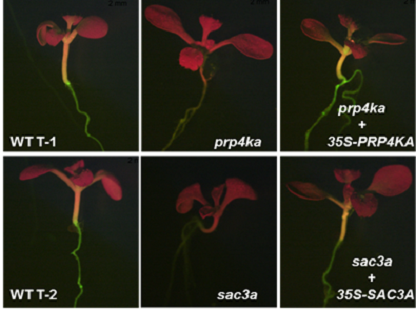[Antonius Matzke, Marjori Matzke] Genetic analysis reveals that PRP4KA, a putative spliceosomal protein kinase, is important for alternative splicing and development in Arabidopsis thaliana
POST:A. GFP-weak fluorescence in seedlings of prp4a and sac3a mutants (prp4ka-2/gfw5-2 and atsac3a-3/gfw6-1).
T: wild-type (WT) T line (GFP-intermediate control). White bar: 2 mm.
Splicing of pre-mRNAs is an essential step in the expression of most eukaryotic genes. Both constitutive splicing and alternative splicing, which produces multiple mRNA isoforms from a single primary transcript, are modulated by reversible protein phosphorylation. Although the plant splicing machinery is known to be a target for phosphorylation, the protein kinases involved remain to be fully defined. We report here the identification of PRP4 KINASE A (PRP4KA) in a forward genetic screen based on an alternatively-spliced GFP reporter gene in Arabidopsis thaliana (Arabidopsis). Prp4 kinase is the first spliceosome-associated kinase shown to regulate splicing in fungi and mammals but it has not yet been studied in plants. We identified in the same screen mutants defective in SAC3A, a putative mRNA export factor that is highly co-expressed with PRP4KA in Arabidopsis. Whereas the sac3a mutants appear normal, the prp4ka mutants display a pleiotropic phenotype featuring atypical rosettes, late flowering, tall final stature, reduced branching and lowered seed set. Analysis of RNA-sequencing data from prp4ka and sac3a mutants identified widespread and partially overlapping perturbations in alternative splicing in the two mutants. Quantitative phosphoproteomic profiling of a prp4ka mutant detected phosphorylation changes in several serine/arginine-rich proteins, which regulate constitutive and alternative splicing, and other splicing-related factors. Tests of PRP4KB, the paralog of PRP4KA, indicated that the two genes are not functionally redundant. The results demonstrate the importance of PRP4KA for alternative splicing and plant phenotype, and suggest that PRP4KA may influence alternative splicing patterns by phosphorylating a subset of splicing regulators. Contributors to this work include Tatsuo Kanno, Peter Venhuizen, Tuan-Nan Wen, Wen-Dar Lin, Phebe Chiou, Maria Kalyna, Antonius J.M. Matzke and Marjori Matzke. The paper is published in Genetics Society of America – Genetics (https://doi.org/10.1534/genetics.118.301515).
